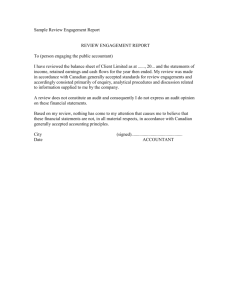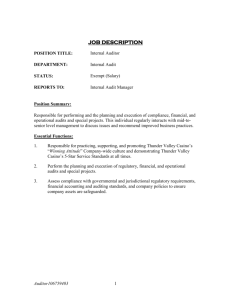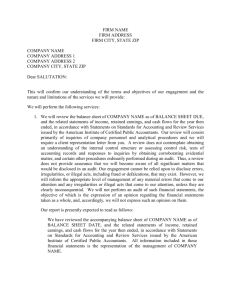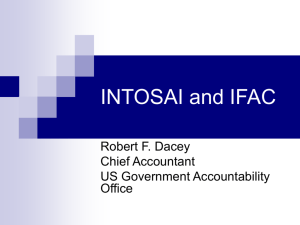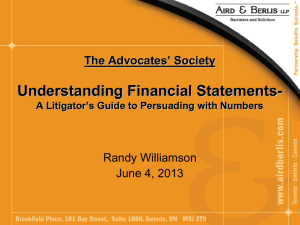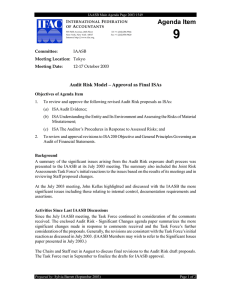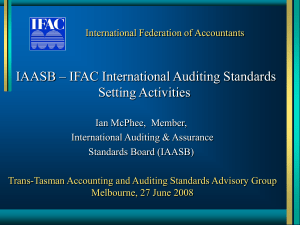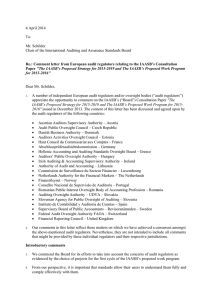(COP 4) Financial Accounts
advertisement
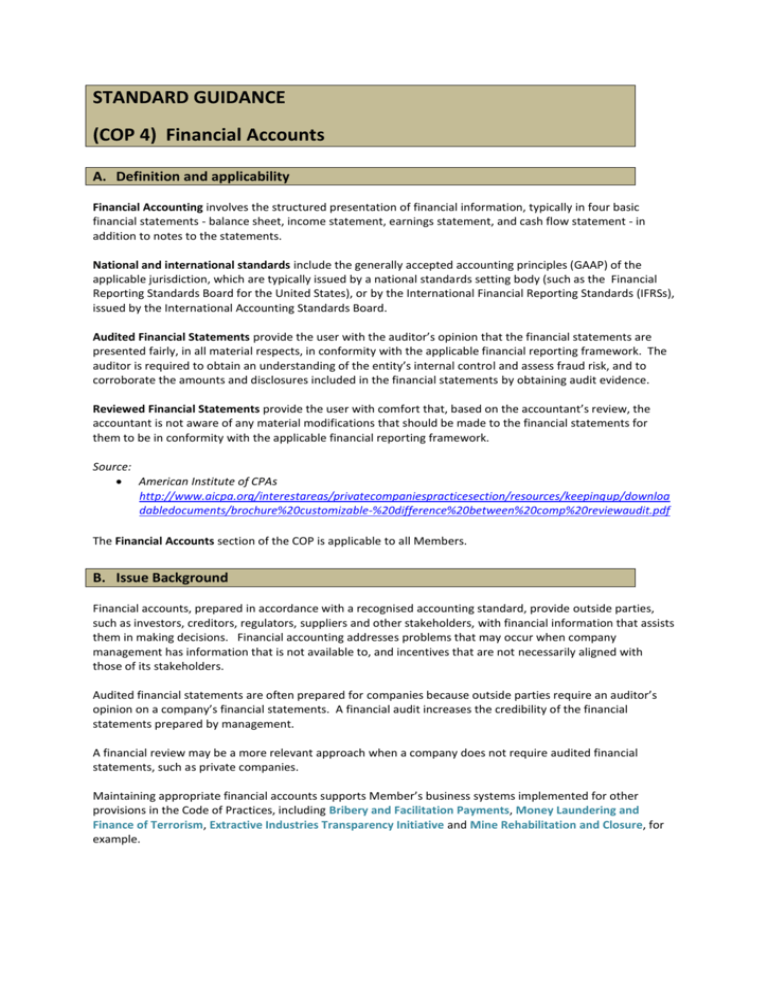
STANDARD GUIDANCE (COP 4) Financial Accounts A. Definition and applicability Financial Accounting involves the structured presentation of financial information, typically in four basic financial statements - balance sheet, income statement, earnings statement, and cash flow statement - in addition to notes to the statements. National and international standards include the generally accepted accounting principles (GAAP) of the applicable jurisdiction, which are typically issued by a national standards setting body (such as the Financial Reporting Standards Board for the United States), or by the International Financial Reporting Standards (IFRSs), issued by the International Accounting Standards Board. Audited Financial Statements provide the user with the auditor’s opinion that the financial statements are presented fairly, in all material respects, in conformity with the applicable financial reporting framework. The auditor is required to obtain an understanding of the entity’s internal control and assess fraud risk, and to corroborate the amounts and disclosures included in the financial statements by obtaining audit evidence. Reviewed Financial Statements provide the user with comfort that, based on the accountant’s review, the accountant is not aware of any material modifications that should be made to the financial statements for them to be in conformity with the applicable financial reporting framework. Source: American Institute of CPAs http://www.aicpa.org/interestareas/privatecompaniespracticesection/resources/keepingup/downloa dabledocuments/brochure%20customizable-%20difference%20between%20comp%20reviewaudit.pdf The Financial Accounts section of the COP is applicable to all Members. B. Issue Background Financial accounts, prepared in accordance with a recognised accounting standard, provide outside parties, such as investors, creditors, regulators, suppliers and other stakeholders, with financial information that assists them in making decisions. Financial accounting addresses problems that may occur when company management has information that is not available to, and incentives that are not necessarily aligned with those of its stakeholders. Audited financial statements are often prepared for companies because outside parties require an auditor’s opinion on a company’s financial statements. A financial audit increases the credibility of the financial statements prepared by management. A financial review may be a more relevant approach when a company does not require audited financial statements, such as private companies. Maintaining appropriate financial accounts supports Member’s business systems implemented for other provisions in the Code of Practices, including Bribery and Facilitation Payments, Money Laundering and Finance of Terrorism, Extractive Industries Transparency Initiative and Mine Rehabilitation and Closure, for example. C. Key regulations Specific requirements for the content of financial statements are determined by the Applicable Law. Having financial statements independently audited is also often legally required, depending on the nature and size of the business, its ownership structure (for example if it is publicly listed) and where it is located. In some cases the requirement for an audit may be waived by the company. The Sarbanes-Oxley Act in the United States has established significant reforms to improve the auditing and accounting procedures of public companies. Auditors should follow generally accepted auditing standards (GAAS), which set out requirements and guidance on conducting audits. Auditing standards may be set by national or international organizations, such as the International Auditing and Assurance Standards Board (IAASB) and adopted by national regulatory bodies. According to the IAASB, over 80 jurisdictions are using or are in the process of adopting or incorporating the clarified International Standards on Auditing (ISAs), issued by the IAASB, into their national auditing standards or using them as a basis for preparing national auditing standards. The International Accounting Standards Board is responsible for the development and publication of International Financial Reporting Standards (IFRSs). Three-quarters of the G20 countries now require the use of IFRSs. D. Suggested implementation approach COP 4.1: Financial Management: Members shall maintain financial accounts of all business transactions in accordance with national or international accounting standards. Points to consider: o The management of a company is responsible for preparing the financial statements, which should be carried out with the oversight of a qualified accountant. o Members should be aware of the applicable law and the generally accepted accounting principles (GAAP) for the jurisdictions in which they operate. COP. 4.2: Independent financial audit or review: Members shall annually undertake a financial audit, or financial review in jurisdictions where permitted, by an independent qualified accountant. Points to consider: o Determine whether an audit is required under law (statutory audit) and thus whether there are specific requirements that apply. o Auditors or reviewers must be independent, in accordance with applicable regulations and professional standards. o The audit or review process provides an opportunity for company management to identify and address risks that could lead to material misstatements in the financial statements, including fraud. Check: Do you know if there are any applicable statutory requirements for your financial accounts? Are your financial accounts maintained in accordance with national or international accounting standards? Has an independent and qualified accountant audited or reviewed your financial accounts? E. Further information The following websites have further information on financial accounting: American Institute of CPAs www.aicpa.org IFRS Foundation and the International Accounting Standards Board (IASB) www.ifrs.org/Pages/default.aspx International Auditing and Assurance Standards Board (IAASB) www.ifac.org/auditing-assurance International Accounting Standards Board - Presentation of Financial Statements www.iasplus.com/en/standards/standard5 U.S. Securities and Exchange Commission (SEC) - Beginners Guide to Financial Statements (2007) www.sec.gov/investor/pubs/begfinstmtguide.htm Deloitte - Audit of statutory financial statements (Belgium) www.deloitte.com/view/en_BE/be/services/aers/audit/auditrequirementsinbelgium/audit-ofstatutory-financial-statements/index.htm Dube – Cuttini – Financial Statements http://dubecuttini.com/services/financial-statements/
